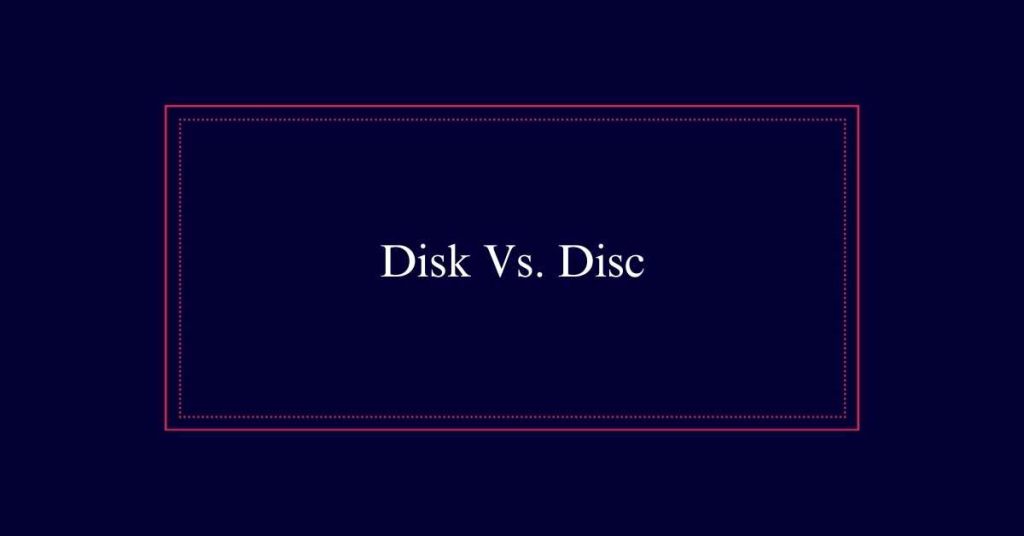Disk Vs. Disc
The terms ‘disk’ and ‘disc’ refer to circular, flat objects but differ in usage. ‘Disk’ is commonly used in American English, particularly in technology for items like hard disks and floppy disks. ‘Disc’ is preferred in British English and often describes sound carriers such as CDs and vinyl records. The choice between the two can reflect regional spelling norms and specific contexts.
Common Characteristics
Both ‘disk’ and ‘disc’ describe a circular, flat shape similar to a plate or CD. The pronunciation remains the same for both spellings. They share the same Latin root word ‘discus,’ derived from the Greek word ‘diskos.’
These terms are often used interchangeably to describe circular objects, reflecting their common origin. The use of ‘disk’ and ‘disc’ is rooted in Ancient Greek culture, particularly in the sport of discus throwing. This historical context underscores their shared characteristics.
Despite their different spellings, the core meaning remains consistent. The terms have evolved to encompass a variety of contexts, yet they retain their fundamental description of a circular, flat object across various applications.
Disk in American English
In American English, ‘disk’ is the preferred spelling, especially in contexts related to computers and technology. This spelling is widely adopted in various technological fields, ensuring consistency and clarity.
For instance, ‘hard disk’ and ‘floppy disk’ are standard terms. The American Medical Association (AMA) also recommends using ‘disk’ for most anatomical references, such as intervertebral disks, except in ophthalmology.
Consider the following to understand its significance:
- Technological Relevance: ‘Disk’ is essential in computer science, referring to storage devices.
- Medical Usage: Used in anatomy, like in ‘spinal disk’, highlighting its importance in healthcare.
- Consistency: Promotes uniformity in American English, making communication clearer.
Disc in British English
‘Disc’ is the preferred spelling in British English, especially for sound carriers like phonograph records and compact discs.
In British contexts, the term ‘disc’ is also used in titles such as ‘disc jockey’ (DJ).
Additionally, agricultural machinery often includes components referred to as discs.
In the field of ophthalmology, British English favors ‘disc’ when describing eye-related terms, contrasting with American English conventions.
This preference extends beyond specific fields to general usage, reflecting regional spelling norms.
While the pronunciation remains the same, the choice of ‘disc’ in British English showcases the subtle differences in language use across the globe.

Computer-Related Terms
While ‘disc’ dominates British English, ‘disk’ takes precedence in the domain of computer-related terms. This distinction is particularly clear in the context of various storage devices and computer components. ‘Disk’ is the preferred spelling for hard disks, floppy disks, and disk drives, reflecting its widespread acceptance in the tech industry.
Consider the following:
- Hard Disk Drives (HDDs): Essential for data storage in computers, serving millions of users globally.
- Floppy Disks: Once a staple for data transfer, these now-nostalgic items revolutionized early personal computing.
- Disk Encryption: An important technology that protects sensitive data from unauthorized access.
Sound Carriers
The term ‘disc’ is widely used to describe sound carriers such as phonograph records and compact discs. These items are known for their circular shape and ability to store audio data.
Phonograph records, often called vinyl discs, have grooves that a needle reads to produce sound. Compact discs, or CDs, use laser technology to read digital information encoded on their surface.
The term ‘disc’ is preferred in British English for these sound carriers, distinguishing them from computer-related ‘disks’ in American English. The title ‘disc jockey,’ or DJ, also reflects this usage, highlighting the connection between the term ‘disc’ and music.
Medical Terminology
In medical terminology, the word ‘disk’ is generally used in American English for anatomical references, except in ophthalmology where ‘disc’ is preferred. This distinction is important for accurate communication in medical settings.
For example, ‘disk’ is used when referring to spinal structures, such as intervertebral disks. Conversely, ‘disc’ is used for eye-related terms like the optic disc.
Consider these points for clarity:
- Spinal Health: Miscommunication regarding spinal disks can lead to incorrect treatments.
- Eye Examinations: Accurate terminology helps in diagnosing optic disc issues.
- Patient Records: Consistent use of terms ensures precise medical documentation.
Agricultural Equipment
Agricultural equipment often includes discs used for soil preparation and cultivation. These discs are vital tools in modern farming. They are typically circular, flat, and sharp-edged.
Discs help in breaking up soil clumps, making it easier to plant seeds. They also assist in weed control by cutting through unwanted vegetation. This equipment is essential for maintaining soil health and ensuring successful crop yields.
Discs come in various sizes and materials, suited for different types of soil and farming needs. They are often attached to tractors or other machinery. This allows for efficient and large-scale farming operations.
Historical Origins
Rooted in ancient Greek culture, the terms ‘disk’ and ‘disc’ trace their origins back to the discus-throwing events of the early Olympics. These words come from the Greek word ‘diskos,’ which referred to the round, flat object used by athletes.
Over centuries, the words evolved but retained their core meaning related to circular objects.
The historical journey of these terms can be summarized as follows:
- Ancient Greece: Originating from ‘diskos,’ associated with athletic events.
- Latin Influence: Adapted to ‘discus’ in Latin, retaining the circular shape reference.
- Modern English: Split into ‘disk’ and ‘disc’ with regional spelling preferences.
Ancient Greek Influence
The influence of ancient Greek culture on the terms ‘disk’ and ‘disc’ is profound and enduring. Both words trace their origins to the Greek word ‘diskos,’ which referred to a circular object used in discus throwing. This sport was a prominent part of the ancient Greek Olympics and had significant cultural importance.
The Latin adaptation ‘discus’ further embedded these terms into the lexicon. The shape and concept of a flat, circular object have persisted through centuries, leading to modern usage in various fields. Whether in technology, medicine, or entertainment, the ancient Greek influence remains evident.
Regional Spelling Preferences
Regional spelling preferences for ‘disk’ and ‘disc’ reflect distinct linguistic traditions in American and British English. In the United States, ‘disk’ is commonly used, especially in computer-related contexts like hard disks and floppy disks. Conversely, ‘disc’ is favored in the United Kingdom, particularly for sound carriers such as compact discs and phonograph records. These preferences reveal more than just spelling choices—they highlight cultural and professional distinctions.
Consider these emotional aspects:
- Familiarity: Using the preferred regional spelling makes written communication feel more relatable.
- Precision: Correct usage can denote professionalism and expertise.
- Identity: Spelling variations can evoke a sense of belonging to a particular linguistic tradition.






